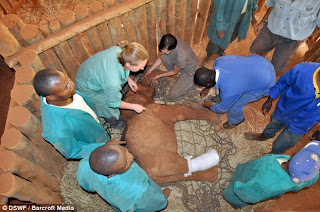A baby elephant who was almost hacked to death by ivory poachers is walking again thanks to an ingenious new boot and lots of TLC.
The 17-month-old calf called Suni was found in Zambia almost a year ago dragging herself along by her front legs, weak and dehydrated, after suffering severe axe wounds.
Elephant poaching across Africa is now at its highest level for more than 20 years, which campaigners say is due to increased demand for ivory from newly affluent Chinese consumers.
Suni's mother had been killed and stripped of her tusks, while a deep wound to Suni's spine had paralysed the new-born calf's right leg.
Back on her feet: Orphaned elephant calf Suni tests her new leg cast at the David Shepherd Wildlife Foundation supported Elephant Orphanage Project near Lusaka, Zambia
But staff at the Elephant Orphanage Project near Lusaka, the Zambian capital, came to Suni's aid and nursed her back to health.
They flew in a team of specialists from Norway and the U.S. to operate on the orphaned youngster and fit her with an aluminium leg support which has put her back on her feet.
'It was touch and go at first. But as the swelling decreased in her back she demonstrated increasing feeling in her leg,' said Rachel Murton, manager of the Elephant Orphanage.
'With a combination of physiotherapy, massage and intense nursing we kept our fingers crossed for this little fighter.'
Left for dead: Suni was found in Zambia almost a year ago dragging herself along by her front legs, weak and dehydrated, after suffering severe axe wounds. Her mother had been killed and stripped of her tusks
The unique leg support which was designed and built specifically for Suni is made of aluminium, PVC and leather.
With her regained mobility Suni is able to charge around with her friends at the orphanage, but she still needs constant care, medical support and milk feeds every three hours.
Frolicking: With her regained mobility Suni is now able to charge around with her friends at the orphanage, but she still needs constant care, medical support and milk feeds every three hours
She is on the road to recovery, however. Kelvin Chanda, head keeper at the orphanage, said: 'You cannot imagine the excitement from all involved when Suni finally walked normally for the first time.'
A worldwide moratorium on trading in ivory has been in place since 1989 but since 1997 there have been sustained attempts by certain countries to overturn the ban, according to campaign group
Injuries: When she was found nearly a year ago, a deep wound to Suni's spine had paralysed her right leg
Vets preparing Suni for her operation: Specialist flew in from Norway and the U.S. operate on the orphaned youngster and fit her with the aluminium leg support which has put her back on her feet
Vets prepare to work on Suni's damaged leg and spine: The unique leg support, which was designed and built specifically for Suni, is made of aluminium, PVC and leather
Rachel Murton, manager of the Elephant Orphanage, said: 'It was touch and go at first. But as the swelling decreased in her back she demonstrated increasing feeling in her leg'
'With a combination of physiotherapy, massage and intense nursing we kept our fingers crossed for this little fighter,' Ms Murton added
A bloody trade: Across Africa, elephant poaching is now at its highest level for more than 20 years, which campaigners say is due to increased demand for ivory from newly affluent Chinese consumers
Suni bonding with another orphan: A worldwide moratorium on trading in ivory has been in place since 1989 but since 1997 there have been sustained attempts by certain countries to overturn the ban
Botswana, Namibia and Zimbabwe were in 1999 allowed an 'experimental one-off sale' of over 49,000kg of ivory to Japan.
A further one off-sale was approved in 2002 and finally took place in 2008, resulting in 105,000kg of ivory being shipped to China and Japan.
In 2009, over 20,000kg of ivory was seized by police and customs authorities worldwide and in 2011, just thirteen of the largest seizures amounted to over 23,000kg, breaking all records since the ivory ban.
The United Nations Convention on International Trade in Endangered Species of Wild Flora and Fauna organisation last summer recognised that elephant poaching had reached 'unsustainable' levels.
Cynthia Moss, of the Amboseli Elephant Research Project in Kenya, where elephants are protected in a national park, said: 'It is very discouraging having to fight the battle to save elephants once again.
'The 1989 ban helped elephants to recover in most parts of Africa. Now even in Amboseli we're losing elephants to ivory poachers for the first time in many years.
'The sale of any ivory - legal or not - is creating demand. No one needs ivory. It is a beautiful substance, but the only ones who need it are elephants.'
Source : dailymail
























Post a Comment